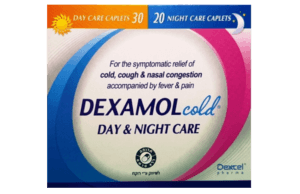 Cold and flu symptoms can hit any time—clogged sinuses, a pounding headache, and that relentless cough that won’t quit. Many turn to Dexamol Cold and Flu Tablets for relief, trusting its separate day and night formulas to work when needed. But could these tablets come with an unexpected twist? Some ingredients may cause drowsiness at the wrong time, leaving you sluggish during the day or wired at night. Let’s take a closer look at what’s inside and whether Dexamol is as sleep-friendly as it seems.
Cold and flu symptoms can hit any time—clogged sinuses, a pounding headache, and that relentless cough that won’t quit. Many turn to Dexamol Cold and Flu Tablets for relief, trusting its separate day and night formulas to work when needed. But could these tablets come with an unexpected twist? Some ingredients may cause drowsiness at the wrong time, leaving you sluggish during the day or wired at night. Let’s take a closer look at what’s inside and whether Dexamol is as sleep-friendly as it seems.
What is Dexamol?
Dexamol Cold and Flu Tablets are specifically designed to ease symptoms of the cold and flu, such as coughing, nasal congestion, fever, and body aches. These tablets come in two formats: one for daytime use and one for nighttime use. Each format is tailored to provide the best relief appropriate for that time of day.
The daytime caplets contain:
- Paracetamol (325 mg)
- Guaifenesin (200 mg)
- Pseudoephedrine (25 mg)
- Dextromethorphan (10 mg)
The nighttime caplets contain:
- Paracetamol (500 mg)
- Pseudoephedrine (25 mg)
- Dextromethorphan (10 mg)
- Chlorpheniramine (2 mg)
What does each ingredient in Dexamol Cold and Flu do?
The role of paracetamol in Dexamol 
Paracetamol (also known as acetaminophen) can reduce pain and fever, and it does this differently from traditional anti-inflammatory drugs like ibuprofen. It works by stopping the production of prostaglandins, chemicals that contribute to pain and swelling by promoting inflammation. Dexamol for pain relief works by lowering these chemicals, which helps to ease discomfort and bring down a high temperature.
Paracetamol is not itself a cause of drowsiness or sleepiness, as it is not a sedative or a sleep aid. However, some people may feel tired or sleepy after taking it. This could happen for several reasons.
- People with illnesses like the flu or a cold may already feel tired or sleepy, which might be confused with the side effects of the medication.
- Taking too much paracetamol is not recommended and can cause side effects like tiredness or sleepiness. Stick to the recommended dose to prevent possible health problems.
- Some people react differently to medication. Some might feel calmer or sleepier after pain or symptoms are relieved, even if it isn’t meant to cause drowsiness.
Guaifenesin makes it easier to cough up mucus.
Guaifenesin helps clear mucus from the airways. It is often used to relieve symptoms of colds, the flu, or other respiratory issues that cause too much mucus to build up. By increasing the water content in mucus, guaifenesin makes it thinner and less sticky, which makes it easier to cough up and remove from the lungs.
Guaifenesin may cause more frequent coughing, especially when a person is lying down. This can interfere with sleep by making it harder to fall asleep or stay asleep through the night. This is why it is only included in the daytime Dexamol tablets rather than the night time.
Pseudoephedrine works to relieve stuffiness in the nose and ears.
Pseudoephedrine is a decongestant that helps reduce nasal congestion by shrinking swollen blood vessels in the nose. This can help relieve nasal and sinus congestion as well as other respiratory issues. It is combined in Dexamol with pain relief and other cold and flu treatments for added effectiveness, targeting all symptoms that come with cold and flu.
The most common side effects of pseudoephedrine are difficulty sleeping, feeling restless, skin irritation like rashes or itching, reduced appetite, and a sensation of warmth or redness beneath the skin. It can also cause a false positive on urine tests for amphetamines.
Dextromethorphan helps stop coughing.
Dextromethorphan is a widely used cough suppressant found in over 100 different over-the-counter (OTC) medications. It reduces how frequently a person coughs by calming the cough reflex. Drowsiness is an uncommon side effect of dextromethorphan, but it can occur.
Chlorpheniramine reduces a runny nose and nasal congestion.
Chlorphenamine is a type of antihistamine used to ease allergy symptoms. It is considered a sedating antihistamine, meaning it is more likely to cause drowsiness compared to other types of antihistamines. It is included in the Dexamol nighttime formula for this reason.
Does Dexamol cause sleepiness?
Dexamol may cause drowsiness depending on how the body reacts, but the daytime and nighttime versions blends work differently. The daytime caplet blend doesn’t include chlorpheniramine, which is the key ingredient in the nighttime capsules that causes drowsiness, so drowsiness is more likely to occur with the nighttime blend.
Daytime caplets are designed to ease pain, lower fever, and clear mucus and nasal congestion. They help improve breathing during the day by encouraging the body to remove mucus and congestion through coughing and sneezing. Nighttime caplets, on the other hand, focus on reducing coughing and sneezing and contain a sedating antihistamine to allow for a more restful, uninterrupted sleep.
Some prescription drugs, such as some antidepressants, opioids, and benzodiazepines, can also increase drowsiness. Patients taking any of these should consult a healthcare provider to discuss whether taking Dexamol might conflict with their medications and if any adjustments are needed.
Dexamol dosage
When taking Dexamol tablets, it is important to follow the instructions on the leaflet and talk to a doctor or pharmacist if anything is unclear. Generally for daytime use, adults can take one to two caplets every four to six hours, with a maximum of four doses in a 24-hour period. Children aged six to nine should take half a caplet every four to six hours, no more than four times a day. Children aged 10 to 12 may take one caplet every four to six hours, also limited to four doses daily.
For nighttime use, adults should take one to two caplets before bed. Children aged six to nine should take half a caplet, while those aged 10 to 12 should take one caplet before bedtime.
Caplets can be split or crushed and should be taken with water. To avoid stomach discomfort, taking the medication with food is recommended.
Patients should review all other medications they are currently using, as some may contain similar ingredients, leading to a cumulative effect. It is best to consult a pharmacist or doctor to ensure that combining medications is safe.
What are Dexamol’s side effects?
Most people taking Dexamol do not report any significant side effects. However, some experience minor issues such as feeling drowsy or dizzy, a dry mouth, nausea, or mild stomach discomfort.
FAQs
How much pseudoephedrine is too much?
For adults, no more than 240 milligrams should be taken in one day, not more than half that (120 mg) by teenagers and not more than 60 mg by children under 12. In all of these, the allowed maximum should be split into at least four separate doses (three during the day and one at night.) Dexamol tablets contain 25mg of pseudoephedrine, so for a child, the limit should be not more than one half-tablet in each dose. For 12 – 18 year-olds, not more than four doses of a full tablet is the recommended limit. Adults should not take more than two tablets with each dose. Symptoms of pseudoephedrine overdose include restlessness, nervousness, tremors, rapid breathing and heart rate, elevated blood pressure, and possible seizures. If you or someone you know experiences these symptoms after taking Dexamol, seek medical attention immediately.
Is it OK to take Dexamol every day?
Dexamol can be used for a few days, usually up to seven days, to temporarily relieve a stuffy or blocked nose. It should only be used for more than seven days if approved by a doctor.
Can I take caffeine with Dexamol tablets?
Too much caffeine can make the stimulant side effects of the pseudoephedrine in Dexamol worse. It is advisable to limit other sources of caffeine, such as coffee, tea, soda, chocolate, or some herbal supplements, while using Dexamol. Talk to a doctor if you are taking other medicines that contain caffeine.
What substances can interact with Dexamol?
Dextromethorphan and guaifenesin can interact with drugs that slow down breathing, like benzodiazepines, opioids, or alcohol. They can also interact with medications that impact heart rhythm.
Is guaifenesin in Dexamol an antihistamine or a decongestant?
Guaifenesin is a medicine that helps make mucus in the lungs thinner and easier to cough up. This is known as an expectorant, so it is not a decongestant or an antihistamine.

















